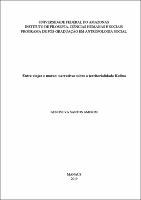| ???jsp.display-item.social.title??? |


|
Please use this identifier to cite or link to this item:
https://tede.ufam.edu.br/handle/tede/7105| ???metadata.dc.type???: | Tese |
| Title: | Entre viajar e morar: narrativas sobre a territorialidade Kulina |
| ???metadata.dc.creator???: | Amorim, Genoveva Santos  |
| ???metadata.dc.contributor.advisor1???: | Oliveira Filho, João Pacheco de |
| ???metadata.dc.contributor.referee1???: | Bruno, Ana Carla dos Santos |
| ???metadata.dc.contributor.referee2???: | Silva, Raimundo Nonato Pereira da |
| ???metadata.dc.contributor.referee3???: | Silva, Katiane |
| ???metadata.dc.contributor.referee4???: | Quintero, Pablo |
| ???metadata.dc.description.resumo???: | Esta é uma etnografia dos Kulina (falantes de uma língua pertencente à família arawa) na região do baixo rio Juruá, no estado do Amazonas, na qual são analisados os processos de territorialização, com enfoque nos conceitos próprios de território, política e etnicidade. O foco descritivo e analítico se dirige às narrativas e aos eventos nos quais sobressai a relação dos Kulina entre si, com outros povos indígenas da região e com a sociedade nacional. A chave de interpretação é a concepção de território – como algo construído e imaginado: o território como local de morada dos humanos; o território como local de morada dos seres extra-humanos; e o território como local do conhecimento. Assinala-se que o “jeito de morar” dos Kulina não separa em lugares ou patamares fixos os humanos e os seres extra-humanos. Verifica-se, através de narrativas e processos, como os Kulina reinterpretam e recriam as tradições para enfrentar os desafios na sua relação com a sociedade nacional e globalizada. Constata-se a forma como as narrativas acessam a memória para construir o espaço, o tempo e ressignificar as lutas atuais. Uma memória que é individual, mas é ao mesmo tempo coletiva, e diferente da memória oficial do Estado e de seus agentes. É nesse sentido que esta etnografia pretende contribuir com debates acerca da relação entre grupos étnicos e sociedade nacional, bem como na formulação e implantação de políticas públicas pautadas nos direitos indígenas |
| Abstract: | This is an ethnography of the Kulina—indigenous people who speak a language belonging to the Arawa family—who live in the lower Jurua River area in the Amazon region. It focuses on the processes of territorialization, with emphasis on their concepts of territory, policy, and ethnicity. The descriptions and analysis focus on the narratives, events, and relationships among the Kulina themselves, with other indigenous people in the Amazon region, and with Brazilian society as a whole. The interpretation key is the concept of territory as a place of knowledge and of both human and extra-human habitats. This study points out that the Kulina way of life does not have fixed locations or levels to distinguish between humans and extra-humans. It identifies the narratives and processes through which the Kulina reinterpret and recreate traditions to face the challenges in their relationship with a globalized Brazilian society. The research also identifies the ways in which their narratives access memories to construct space, time, and meaning to their current struggles. Their memories are both individual and collective, but different from the official memories of the State and its agents. In this sense, this ethnography contributes to the debates regarding the relationship between ethnic groups and national societies, as well as public policies based on indigenous rights. |
| Keywords: | Kulina Território Política Etnicidade Direitos indígenas |
| ???metadata.dc.subject.cnpq???: | CIÊNCIAS HUMANAS |
| Language: | por |
| ???metadata.dc.publisher.country???: | Brasil |
| Publisher: | Universidade Federal do Amazonas |
| ???metadata.dc.publisher.initials???: | UFAM |
| ???metadata.dc.publisher.department???: | Instituto de Filosofia, Ciências Humanas e Sociais |
| ???metadata.dc.publisher.program???: | Programa de Pós-graduação em Antropologia Social |
| Citation: | AMORIM, Genoveva Santos. Entre viajar e morar: narrativas sobre a territorialidade Kulina. 2019. 299 f. Tese (Doutorado em Antropologia Social) - Universidade Federal do Amazonas, Manaus, 2019. |
| ???metadata.dc.rights???: | Acesso Aberto |
| ???metadata.dc.rights.uri???: | http://creativecommons.org/licenses/by-nc-nd/4.0/ |
| URI: | https://tede.ufam.edu.br/handle/tede/7105 |
| Issue Date: | 18-Mar-2019 |
| Appears in Collections: | Doutorado em Antropologia Social |
Files in This Item:
| File | Description | Size | Format | |
|---|---|---|---|---|
| Tese_GenovevaAmorim_PPGAS.pdf | 16.11 MB | Adobe PDF |  Download/Open Preview |
This item is licensed under a Creative Commons License





